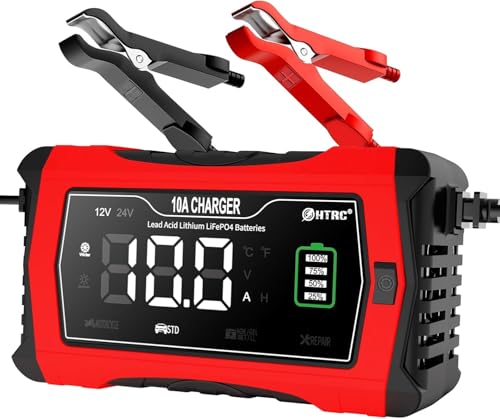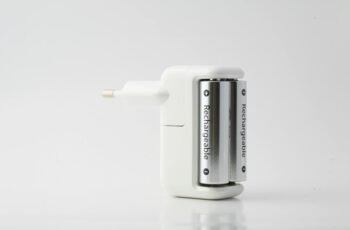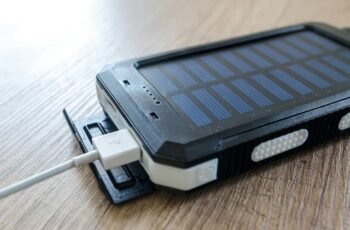We want safety, we want speed, we want smart charging—and LiFePO4 packs demand all three. This year’s top chargers hit precise 14.6V targets, taper current intelligently, and wake 0V-protected batteries without fuss. From compact 20A units to rugged 50A workhorses and multi-bank marine options, we’ve narrowed the field to five standouts. We’ll compare features that matter—independent banks, connectors, cable length, and protections—so you can pick with confidence, not guesswork.
Key Takeaways
- Prioritize chargers with a 14.6V CC/CV LiFePO4 profile, 0V wake-up, and 3-stage logic for safe, full, and BMS-friendly charging.
- Match current to battery size: 10–20A for 100Ah packs; higher amps shorten charge time but increase heat and fan noise.
- Look for robust protections (over-voltage/current, short, over-temp), auto-stop with smart resume, and temperature compensation to protect cycle life.
- Multi-bank options like NOCO GEN5X3 offer independent LiFePO4 per-bank charging, IP68 sealing, thermal sensing, and Force Mode for dead packs.
- Prefer flexible connectivity: M8 ring terminals, Anderson connectors, and alligator clips with long, heavy-gauge leads for secure, low-resistance installs.
ECO-WORTHY 12V 20A LiFePO4 Battery Charger
Need a 12V LiFePO4 charger that wakes up depleted batteries and gets you back to 100% fast? We like ECO-WORTHY’s 12V 20A: true 0V activation, smart 3-stage charging, and a 14.6V constant-voltage profile. It pushes up to 20A, so a 12V 100Ah LiFePO4 can reach full in about five hours; expect roughly 50% in 2.5 hours. The quick connector with upgraded M8 terminals, two connection methods, and a main power switch simplify setup. Two LEDs show four states. Protections cover over-voltage, over-current, short-circuit, and over-temp, plus auto-stop. It’s portable, but the fan’s audible and HF radios may hear RF noise below 10 MHz.
Best For: 12V LiFePO4 battery users (RV/boat/off-grid) who need fast, reliable charging with 0V activation for deeply discharged packs.
Pros:
- True 0V activation and smart 3-stage charging at 14.6V, up to 20A for rapid recovery
- Simple connectivity with quick connector, upgraded M8 terminals, and main power switch
- Built-in protections (OV/OC/SC/OT) with auto-stop; portable with clear LED status
Cons:
- Cooling fan is audible and unit can get warm during operation
- Generates RF noise below 10 MHz—poor choice near HF radio use
- Short ~3 ft leads may limit placement options
10-Amp Smart 12V/24V Car Battery Charger and Maintainer
For drivers who want a set‑and‑forget charger that handles both 12V and 24V LiFePO4 and lead‑acid batteries, the Amp Smart 10A stands out. We like its fully automatic operation, memory restart, and clear backlit LCD showing volts, amps, percent, and temperature. It delivers 10A at 12V (5A at 24V), with temperature compensation to prevent over‑ or under‑charging. Safety is solid: protections for reverse, short, over/under‑voltage, overcurrent, and overheat, plus auto shut‑off near full.
Repair and desulfation modes can revive some idle batteries, though not the truly spent. It’s compact, metal‑cased, detects 24V automatically, and suits cars, boats, bikes, and mowers.
Best For: Drivers and DIYers who want a fully automatic, set-and-forget 10A charger/maintainer for 12V/24V LiFePO4 and lead-acid batteries across cars, boats, motorcycles, and lawn equipment.
Pros:
- Fully automatic with memory restart and auto 24V detection; clear backlit LCD shows volts/amps/percent/temperature.
- Versatile chemistry support (LiFePO4, AGM, Gel, SLA, flooded) with temperature compensation and multiple safety protections.
- Includes desulfation/repair modes to help revive and maintain aging or idle batteries; compact, durable metal housing.
Cons:
- Cannot jump-start a vehicle; designed only for charging/maintaining.
- Repair mode won’t fix spent or permanently damaged batteries; results vary with battery condition.
- May get warm and can spark briefly when connecting; best to follow connection order and avoid power strips.
12V 20A LiFePO4 Battery Charger with 2 Connectors
Looking to fast-charge a 12V (12.8V) LiFePO4 battery with minimal hassle? We like this 12V 20A charger for its 14.6V profile, 3-stage logic, and two plug-and-play connectors. Use the Anderson lead to swap between bolt-on M8 terminals (leave them installed) and alligator clips. The 9 ft cable keeps setups tidy in cars, RVs, boats, solar, or off-grid gear.
Status is clear: Red On (standby/0V wake-up), Red Flash (0–80%), Yellow Flash (80–99%), Green On (100%). It wakes BMS-cut batteries, charges a 100Ah pack in ~5 hours, and auto-reduces current. Protections cover eight faults, with microprocessor monitoring, auto resume, and a 15-hour safety cutoff.
Best For: RV, marine, and off‑grid users who need a fast, 14.6V smart charger for 12V (12.8V) LiFePO4 batteries with easy swap-between connectors and clear status indicators.
Pros:
- Fast 20A, 3-stage charging with 14.6V LiFePO4 profile; ~5 hours for 100Ah battery
- Two connection methods (M8 terminals and alligator clips) via Anderson connector and 9 ft cable
- Smart protections: BMS wake-up, auto-amp reduction, microprocessor monitoring, auto resume, 15-hour safety cutoff
Cons:
- AC input limited to 100–120V, not ideal for 220–240V regions without a transformer
- Single chemistry/profile focus (12V LiFePO4); not suited to lead-acid or other chemistries
- Built-in cooling fan may produce noise in quiet environments
NOCO Genius GEN5X3 3-Bank 15A Marine Battery Charger
Built for multi-battery boats and RVs, the NOCO Genius GEN5X3 shines when you want one compact charger to manage three 12V batteries—each with its own chemistry. We like its three independent 5A banks, selectable 12V, AGM, Lithium (LiFePO4), and Repair modes, plus Force Mode to kick-start from zero volts. It’s 37% smaller and 43% more powerful than the GENM3, yet fully sealed IP68 for harsh marine duty, with a thermal sensor to prevent over/undercharging.
Installation’s straightforward: any orientation, anti-vibration backing, 72-inch leads with 3/8-inch eyelets, and Type-B AC. It’s UL/ISO/Coast-Guard compliant, 3-year warrantied, and consistently keeps trip-ready batteries.
Best For: Multi-battery boat and RV owners who need a compact, waterproof onboard charger to independently manage and maintain three 12V batteries across different chemistries (lead-acid and LiFePO4).
Pros:
- Three independent 5A banks with selectable 12V, AGM, Lithium, and Repair modes; Force Mode can start charging from zero volts.
- IP68 fully sealed, vibration-isolated design with thermal sensor for safe, reliable marine use; compliant with UL1236, ISO 8846, and 33 CFR 183.410.
- Easy installation in any orientation with 72-inch leads and 3/8-inch eyelets; compact yet 43% more powerful than the previous GENM3.
Cons:
- Total output is 15A (5A per bank), which may be slow for large-capacity batteries or rapid turnarounds.
- Premium price compared to simpler single-bank or lower-feature chargers.
- Occasional compatibility quirks reported with certain onboard loads and typical warranty turnaround considerations.
14.6V 50A LiFePO4 Battery Charger and Maintainer
Serious DIYers and RV owners who need rapid recovery on big 12V LiFePO4 banks will appreciate a 14.6V/50A charger-maintainer that actually pushes near its rated current. Ardroit’s 50A unit uses a CC/CV profile, supports 0V start, and auto‑shuts off when full. It’s built in aluminum with thick 8‑gauge leads, ring terminals and clamps, plus mounting slots. Protections cover overcharge, over‑voltage, over‑temp, overtime, and shorts.
We like the speed and simple setup, but it runs hot, the fan’s loud, and efficiency complaints (roughly 600W out vs ~1100W in) pop up. Use secure connectors—loose clamps create resistance and risk. Avoid deeply dead packs; some won’t wake. 12‑month warranty.
Best For: Serious DIYers, RV owners, and off‑grid users who need fast, high‑current charging for large 12V LiFePO4 banks and want a simple, mountable charger‑maintainer with safety protections.
Pros:
- Near‑rated 50A output with CC/CV profile for quick recovery and proper LiFePO4 charging, including 0V start
- Solid build: aluminum case, thick 8‑gauge leads, both ring terminals and clamps, and mounting slots
- Multilevel protections and auto shut‑off; works with or without a BMS
Cons:
- Runs hot and the cooling fan can be loud during operation
- Reported efficiency concerns (~600W out vs ~1100W in) and notable heat generation
- Connector issues: non‑standard Anderson, clamp loosening risks high resistance/heat; may not revive deeply dead packs
Factors to Consider When Choosing Chargers for Lifepo4 Batteries
Before we pick a charger, we should match charging voltage/current to our pack and confirm it explicitly supports LiFePO4 chemistry. We’ll look for solid safety protections and smart charging algorithms that manage bulk, absorption, and balance without stressing the cells. We’ll also check connectivity and cables—lead length, clamp quality, and plug options—to ensure a clean, reliable setup.
Charging Voltage/Current
Wondering how much voltage and current your LiFePO4 needs? For a 12V pack, we look for chargers that target about 14.6V at full charge. Most quality models follow a CC/CV profile: they push constant current first, then taper to hold voltage as the battery tops off. That’s the sweet spot for speed and safety.
Current matters just as much. Higher amps shorten charge time but add heat and stress. We match current to capacity and BMS guidance—typically between C/5 and C/1. For example, up to 20A is common for many 12V systems.
We also value 3-stage logic and temperature compensation to stabilize voltage and protect cells. Finally, a 0V wake-up mode is clutch for safely reviving packs that a BMS has shut down.
Battery Chemistry Support
Looking for a charger that truly understands LiFePO4? We should verify it explicitly supports 12V LiFePO4 chemistry with a constant-voltage target around 14.6V and matching current profiles. Multi-chemistry models are fine, but only if they offer dedicated LiFePO4 modes or per-bank settings that lock the correct voltage and limits—no lead-acid defaults.
We also like chargers with wake-up or 0V start functions to revive packs whose BMS has cut off output. Some include “desulfation” or “repair” modes; results can vary with LiFePO4, so we treat these as optional rather than decisive.
For multi-battery setups, independent-bank chargers let us charge multiple LiFePO4 packs simultaneously with individualized settings. Temperature compensation tailored for LiFePO4 helps maintain proper charge behavior across environments.
Safety Protections
Getting the chemistry right is only half the story; the charger also needs strong safety protections. We look for a suite of safeguards: over‑voltage, over‑current, short‑circuit, over‑temperature, and no‑load protection. These prevent stress that can scar cells or trigger shutdowns. Auto‑stop when the pack reaches full charge—and smart auto‑resume when voltage sags—keeps cells safe without babysitting.
Temperature matters, too. Good chargers monitor sensors and apply temperature compensation, trimming voltage or current as ambient heat rises, then restoring it when conditions cool. That keeps internal resistance and heat under control.
Finally, safety extends to the hardware. Robust terminals, solid clamps, and secure, low‑resistance cabling reduce hot spots that can undermine protection circuits. Top models stack 8–10 protections, lowering the risk of faults, fires, or costly damage.
Charging Algorithms
At the heart of a great LiFePO4 charger is its algorithm—the logic that decides how fast, how long, and how safely it feeds your cells. We look for smart CC/CV behavior: push constant current for speed, then hold a precise voltage as current tapers to protect capacity and heat. For 12V packs, 14.6V termination is the benchmark, with the charger automatically reducing current as the pack tops off.
We also value multi-stage profiles—pre-charge, bulk, and absorption/finish—to improve efficiency over single-stage designs. A good algorithm adds 0V wake-up to revive BMS-protected packs after deep discharge, restoring usability without unsafe spikes. Finally, temperature compensation matters; it adjusts voltage or current with ambient changes to prevent overcharge in heat and undercharge in cold, extending cycle life.
Connectivity and Cables
How will you actually hook the charger to your LiFePO4 bank? We want flexible, secure connections that match the install. Dual connection options are ideal—think M8 ring terminals for permanent wiring, Anderson connectors for quick swaps, and alligator clips for temporary use. Cable length matters, too; 9–12 feet typically lets us reach battery bays without stretching, which reduces resistance and heat.
We also look for vibration-resistant hardware. Bolted M8 terminals or heavy-duty clamps maintain low-resistance paths and stay put on the move. If a pack goes to 0V, a charger with wake-up/0V reactivation—often via dedicated leads—can safely bring it back online.
Finally, included hardware helps. Quick-switch connectors, removable leads, and smart mounting with good cooling prevent loose connections and improve reliability.
Conclusion
We’ve seen how the right LiFePO4 charger can mean safer cells, faster fills, and fewer worries. From multi-bank muscle to rugged 50A power, these smart picks deliver 14.6V precision, 0V wake-up, and rock-solid protection. Now it’s our move—choose the charger that fits your rig, your rhythm, your next adventure. Because the moment we plug in, time shrinks, LEDs blink, and capacity climbs. Hear that quiet click to float? That’s not just a charge—it’s the start of what’s next.







